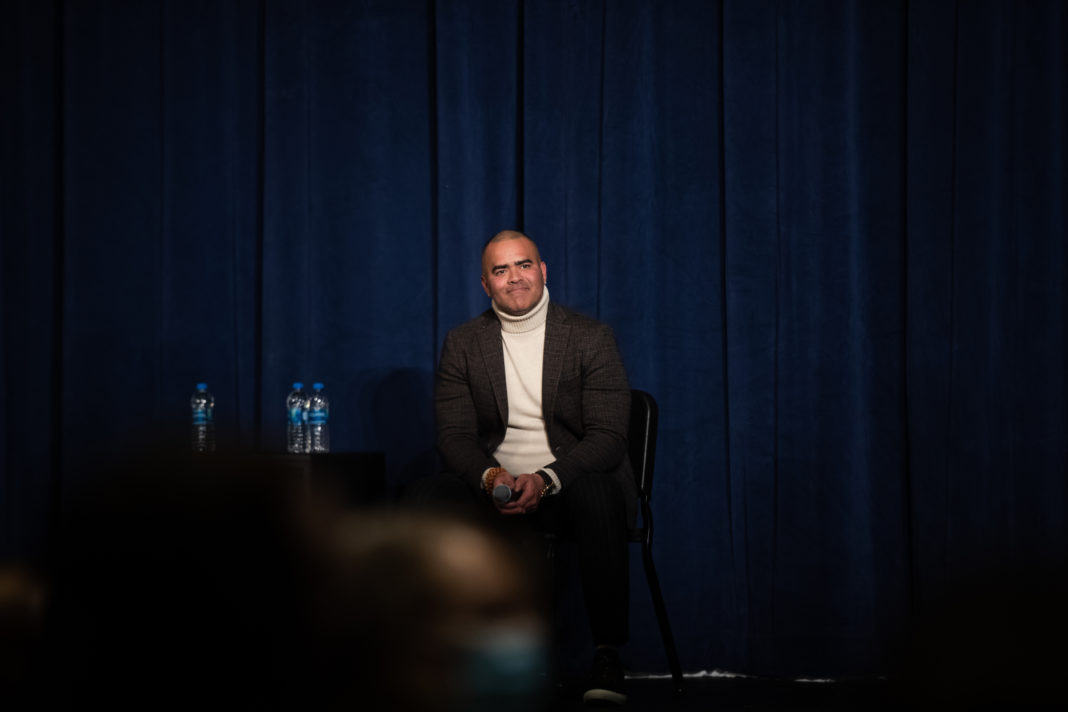“Hamilton” star Christopher Jackson spoke as the Black History Month keynote speaker on Sunday to provide inspiration and tell his story to students.
The University Program Board, the Gender Studies Program, Black Action Society, the Office for Inclusive Excellence and the Frederick Douglass Institute collaborated to host this event in the newly renovated Miller Auditorium.
The event began with Joshua Peters, the university program board director of concerts, introducing Jackson. Jackson was met with an eruption of applause as he walked onto the stage. Jackson began his speech by speaking of his life story and how he got to where he was now.
He talked about some of his recent accomplishments, such as releasing a new album and working on “Sesame Street.” He talked about how he loved hearing what students love to say. Jackson said that he often uses what he hears at events such as this one to help write music.
Jackson began to talk about his early career on Broadway and how that led to him being cast as George Washington in Lin-Manuel Miranda’s Tony award-winning musical “Hamilton.” Jackson made sure to elaborate upon the importance of following one’s dreams and promoting creativity and passion.
Jackson talked about this experience working with Lin-Manuel Miranda. He described Miranda as having one of the greatest creative minds in the modern day of musical theatre.
“When you wake up and meet someone who doesn’t hear the word ‘no,’ and they only hear the word ‘go,’ it really is amazing,” Jackson said.
Jackson spoke of the honor he felt to be playing the first President of the United States as a Black man in “Hamilton.” He said one of his favorite memories of playing the role was when he performed in front of President Barack Obama.
He spoke about the impact that dreaming and love had upon his career and how every single person in the audience deserved to feel that way.
“Whatever you are doing in your life, if there is love, inspiration follows,” Jackson said. “There is strength in your own thoughts and ideas.”
At the conclusion of his speech, Jackson participated in a question and answer segment with the audience. This part of the event was hosted by Anthony Jones, SRU’s chief diversity officer.
Jones asked Jackson about his involvement with Kulture City. Jackson spoke about how he and his wife are involved in the organization, which works to promote acceptance, inclusivity, awareness and engagement for people with disabilities. The organization constructs sensory rooms at different colleges, zoos, stadiums and any other venue where there may be lots of people at one given time for those who may need a break. The organization has currently reached 4 different continents.
Many students wanted to know about Jackson’s experience with “Hamilton” and how it feels to have played such an impactful role.
“It was wonderful to be able to musicalize those dudes,” Jackson said. “George Washington lost a lot in his life, and as a Black man, I can really relate to it.”
Many of the students asking questions prefaced their questions by stating that Hamilton inspired them to feel like they belong. Jackson responded to this by talking about the wonders of musical theatre.
“Show business is not dreams,” he said. “It’s meant to inspire dreams.”
The event concluded with Jackson talking about the importance of perseverance and not listening to people who try to put you down.
“As an artist, you always risk your work not being received,” said Jackson. “Art demands critique. That’s how you know someone is feeling something.”
Ryleigh Hendrickson, a freshman social work major, said seeing Jackson in person was exciting and worth it.
“I’ve been a theatre kid my whole life and have seen the ‘Hamilton’ pro-shot [pro-shot meaning the professionally recorded video of ‘Hamilton’ on Broadway], so seeing Christopher Jackson is so worth it,” she said.
Hendrickson said it is important to bring speakers like Jackson to campus to discuss issues relating to race.
“It gives people a new and better perspective on the modern-day injustices and experiences,” Hendrickson said. “Things are getting better, but it is still important to have these discussions.”








